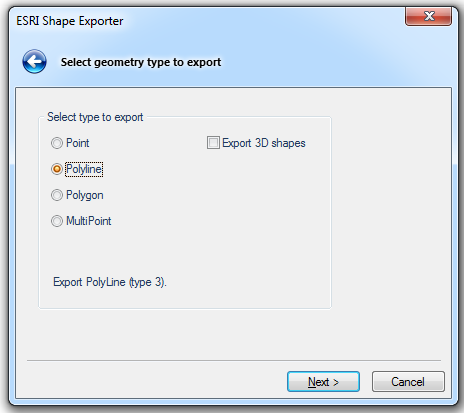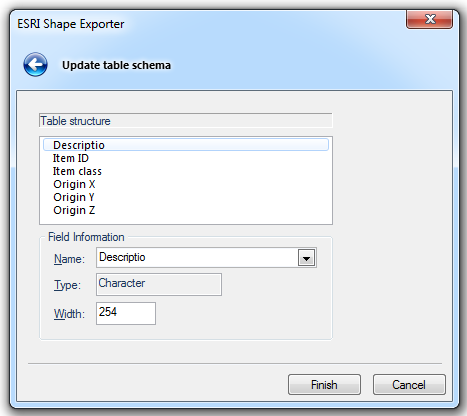
Exports an ESRI ArcView Shapefile.
The ESRI Shapefile is the non-topological based file format for the ESRI AcrView / ArcGIS suite of products. It is an openly specified file format and is regularly used as a common data transfer format as many systems are capable of reading the format. Each file can only store a single type of geometry e.g. Points, LineString or Polygons items. Most features are stored as simple features, i.e. true curves are not stored.
Shapefiles consist of multiple file components, the three core ones being the .shp, .dbf and .shx. The table below gives a brief description of the most common components.
.shp
Contains the geometry information.
.dbf
Contains attribute information dbf column names are limited in length to 10 characters and each table can only contain 255 columns.
.shx
Geometry index information.
.prj
Coordinate reference system information.
Note: This is stored in ESRI WKT not standard WKT. However, when a recognised prj is present SIS will attempt to read the file as cursor not memory based.
.sbn .sbx
These are spatial Index files.
.shp .xml
SIS creates on export the .shp, .dbf, .shx and .prj.Contains metadata information.

Select the geometry types to export, with the option of 3D shapes for each: Point, PolyLine, Polygon and MultiPoint item.
Click Next.
The ESRI Shape Exporter dialog also allows the customisation of the column width in the .dbf file:

This can have significant file size benefits if the columns are reduced below the standard settings where applicable.
Click Finish.
0.0.0 | Point |
1 | PolyLine |
2 | Polygon |
3 | MultiPoint |
10 | PointZ |
11 | PolyLineZ |
12 | PolygonZ |
13 | MultiPointZ |
Note: An accompanying .PRJ file is created if the current Coordinate Reference System is identifiable as an EPSG Code, and there is a ESRI WKT for that code.
See full list of Export Formats
Click to return to www.cadcorp.com
© Copyright 2000-2017 Computer Aided Development Corporation Limited (Cadcorp).